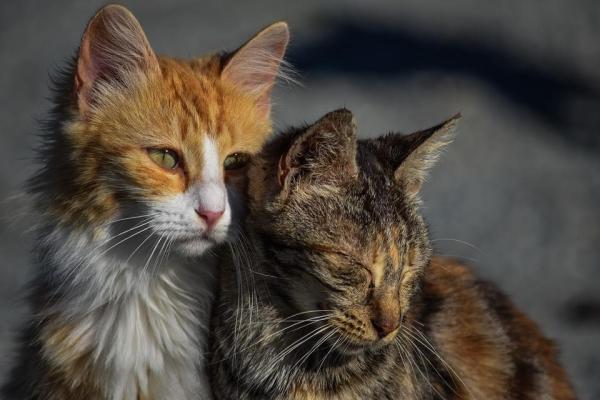Cancer in Cats



See files for Cats
It is common for older cats to develop a range of diseases, often with lumps and deposits forming on different parts of their body. Unfortunately, just as in humans, one of the worst case scenarios is our cat developing cancer. Cancer is a disease which causes an uncontrolled division of cells in the body, most often resulting in the symptom of a malignant tumour. Cancer in cats is becoming more frequent, but it is important to remember the reason. It is because the increased domestication and wider availability of treatment for cats menas they are living older and older cats are more prone to cancer.
Cats living older means that we get to share more of our lives with them and we come to rely on them as trusted friends. This is why AnimalWised brings you all you need to know about cancer in cats - types, symptoms and treatment. Doing so, we can best find ways to ensure we can have the cats in our lives be healthier for longer.
Cancer in cats
Cancer is an umbrella term used to describe a wide range of diseases. What they have in common is the growth and division of cells in certain parts of the body without stopping. This eventually results in their expansion to surrounding tissue. Some types of cancers form lumps known as ‘tumors’ or ‘neoplasia’ which are essentially an accumulation of these malignant cells.
There are several types of neoplasm. Some of these are known as ‘benign’ tumors such as lipoma. They do not invade tissues and spread to surrounding parts of the body. ‘Malignant’ tumors unfortunately are those which do spread during a process which is known as ‘metastasis’.
It is not always possible to know the cause of cancer in cats, but commonly they include:
- Genetic predisposition
- Exposure to certain carcinogens
- Viral infections

Types of cancer in cats
We currently know of a wide range of types of cancer in cats. Here we will discuss the most common types and detail their characteristics:
- Lymphoma: this is considered the most common cancer in cats and it's name derives from lymphocytes, a subtype of white blood cells present in blood, bone marrow, lymph nodes or lymphoid tissue. This cancer can appear anywhere in the body or in several places at once. It is often caused by Feline Leukaemia Virus or the Feline Immunodeficiency Virus.
- Squamous cell carcinoma: this type of cancer affects the dermis and usually goes unnoticed in the beginning. It often gets confused with a simple flesh wound. It commonly affects the nose and/or ears, but doesn't usually metastasise throughout the body.
- Mammary carcinoma: usually observed in unneutered females, although it can present in sterilized females and males. Nodules and swelling are observed in one or more mammary glands.
- Intestinal adenocarcinoma: affecting both the large and small intestines, this type of cancer in cats invades quickly, causing the animal to lose appetite and weight rapidly, concurrent with diarrhea and vomiting.
- Soft tissue sarcoma: also known as fibrosarcoma, this type of cancer forms in fibroblasts usually under the skin. These are firm nodules which increase in size.
- Osteosarcoma: this type of cat related cancer affects the bones and it is common for the cat to exhibit evident signs of pain, such as limping or easy fracturing of the bones.
- Mastocytoma: originating in mast cells which are found throughout the body, it can present as a single mass or multiple nodules sometimes accompanied by an ulcer.
Symptoms of cancer in cats
As we have seen, there are many different types of cancer in cats which affect various tissues within the body. This means the symptoms and signs of feline cancer are also varied and can be difficult to recognize. Additionally, the cancer usually develops slowly at first and shares symptomatology of other common ailments. This, in turn, makes it difficult to promptly detect it. We should also add that most cats which get cancer are those of advanced age.
The most frequent symptoms of feline cancer are:
- Appearance of lumps
- Unusual bleeding
- Wounds that do not heal
- Ulceration of wounds
- Halitosis
- Difficulty eating
- Intermittent or continuous salivation
- Limping
- Snoring and/or persistent cough
- Snorting when breathing
- Vomiting and diarrhea
- Jaundice
- Abdominal distension
- Weakness
- Loss of appetite
- Weight loss
- Depression
With the appearance of one or several of the above symptoms, it is advisable to go immediately to the veterinarian. This is because the rapidity in detection of the disease can improve the prognosis of the condition remarkably.

How to diagnose cancer in cats
Given that any cat can potentially develop cancer, it is best to go to the veterinary center to perform various diagnostic tests. It is also important to recognize that a physical examination is usually not enough to diagnose this disease, resulting in various methods which can take some time to confirm.
These tests will usually include an ultrasound, blood test and/or the use of X-rays to see what is going on in the tissue. However, often these are insufficient to detect the nature of what might be observed, so a biopsy will likely need to be performed. This is when the tissue is extracted and analyzed under a microscope. Depending on the type of cancer, it may be necessary to perform more complex tests such as an electrocardiogram, an MRI or a CT scan.
Cancer treatment in cats
Although dependent on several factors, cancer in cats can be treated if detected promptly enough. Also, the right treatment will need to be carried out. This can significantly improve on the prognosis and extend the cat's life expectancy. Still, it is important to know that not all felines will respond positively to treatment. In many cases of advanced illness, many veterinarians may suggest not pursuing treatment as they will be terminal and the quality of their remaining life will be drastically compromised. In any case, only a specialist will be able to give us the appropriate guidance to make the best decision.
Cancer treatment will vary depending on the type of cancer, the location, presence or absence of metastasis, the economic circumstance of the owner, the quality of life of the cat, their age and the availability of equipment for cancer treatment.
The three main types of cat cancer treatment are:
- Surgery: it is the most used method if the presence of cancer is detected, but may have different objectives. Our veterinarian will decide if it is advisable to bet on the total elimination of the tumor in combination with chemotherapy or radiotherapy treatment. This elimination of the tumor will hopefully result in an improvement in the cat's quality of life. It should be noted that surgery can carry certain risks for the cat and post-operative care in combination with suitable analgesics will be required.
- Radiotherapy: not all veterinary centers will have this method of treatment and it can happen that the specialist will need to refer you to another clinic. Radiation therapy involves applying external radiation to the tumor. This has the ability to kill tumor cells, but also healthy cells. Several sessions are required which can extend the treatment from 3 to 5 weeks. The most frequent side effects are vomiting, nausea, hair loss and skin irritation. However, these can be tempered by the use of certain medication.
- Chemotherapy: we can currently find a wide variety of anticancer drugs which act by attacking the tumor cells from within. This comes in the form of either pills or injections. The side effects of chemotherapy can include hair loss, bone marrow suppression or gastrointestinal irritation.
Cats which undergo cancer treatment will need special care to maintain their quality of life. It may be useful to record the symptoms and behavior of the feline on a daily basis, the objective being to help the vet maintain the right course of cancer treatment.
Included in this specific care for cats with cancer is emphasizing a quality diet, ensuring the basic comfort of the cat, use of pain medication (analgesics), medication to combat secondary infections (antibiotics) and medication for swelling (anti-inflammatories).

This article is purely informative. AnimalWised does not have the authority to prescribe any veterinary treatment or create a diagnosis. We invite you to take your pet to the veterinarian if they are suffering from any condition or pain.
If you want to read similar articles to Cancer in Cats, we recommend you visit our Hereditary diseases category.








